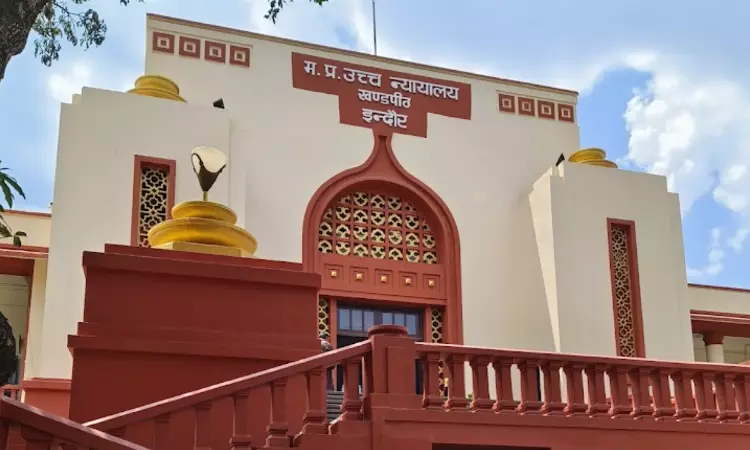- Home
- /
- High Courts
- /
- Madhya Pradesh High Court
- /
- Dismissal Of Woman During Her...
Dismissal Of Woman During Her Absence From Employment Or Pregnancy Has To Be Dealt By Prescribed Authority Under Maternity Benefit Act: Madhya Pradesh High Court
Rajesh Kumar
5 May 2024 10:45 AM GMT
The Madhya Pradesh High Court single bench of Justice Subodh Abhyankar held that dismissal of a woman during her absence from employment or pregnancy has to be dealt by the prescribed authority only, before whom, an efficacious alternative remedy, by way of an appeal, as provided under the Maternity Benefit Act, 1961 lies. Brief Facts: Smt. Priyanshi Garg, a contractual...
The Madhya Pradesh High Court single bench of Justice Subodh Abhyankar held that dismissal of a woman during her absence from employment or pregnancy has to be dealt by the prescribed authority only, before whom, an efficacious alternative remedy, by way of an appeal, as provided under the Maternity Benefit Act, 1961 lies.
Brief Facts:
Smt. Priyanshi Garg, a contractual employee, has filed a writ petition under Article 226 of the Constitution of India challenging an order dated 12/02/2024, issued by respondent No.4, the Principal of Army Public School, Mhow, District Indore (M.P.), terminating her services as a Primary Teacher under Clause 4 of the contract.
The Petitioner was initially appointed on an ad hoc basis as a Primary Teacher of Army Public School, Mhow and later signed an agreement for a 3-year appointment starting from 24/06/2022 to 31/03/2025. She claimed that she diligently performed her duties but faced issues when seeking maternity leave benefits under the Maternity Benefit Act, 1961. Despite her requests, she was verbally informed of the option to go on leave without pay due to insufficient funds. The Petitioner, unwilling to accept leave without pay, formally requested the maternity benefits. Instead of granting the benefits, she received the termination notice on 12/02/2024. Feeling aggrieved, the Petitioner approached the Madhya Pradesh High Court (“High Court”) and filed a writ petition.
The Petitioner contended that the termination was in response to her email of 03/02/2024 and argued that she felt compelled to copy the National Commission for Women due to verbal instructions from Principal. She argued that the termination notice bypassed the provisions of the Maternity Benefit Act, 1961, and constituted an arbitrary exercise of power.
The Management argued that the termination was not solely based on the Petitioner's conduct but also involved the failure to respond to advisory notices. However, it emphasized that the termination didn't reflect negatively on the Petitioner's conduct, and only Clause 4 of the agreement was invoked for termination.
Observations by the High Court:
The High Court noted that an agreement was executed on 24/06/2024, specifying a three-year tenure for the Petitioner's services, commencing from 24/06/2022 and terminating on 31/03/2025. It referred to Paragraph 15 of the Management's reply wherein the Management admitted its willingness to provide maternity benefits to the Petitioner but stated its intention to uphold her dismissal.
Further, it referred to Clause 4 of the contract, which the Manangment invoked to justify the termination. This clause outlined the conditions under which either party could terminate the agreement, stipulating a two-month notice period or salary in lieu thereof. It also specified that the Petitioner could only leave the service of the school upon acceptance of her resignation by the school authority.
In considering the legality of dismissing a woman during her absence from employment or pregnancy, the High Court referred to Section 12 of the Maternity Benefit Act, 1961. This section explicitly prohibited the discharge or dismissal of a woman during her pregnancy if she would have been entitled to maternity benefits. It also provided for an appeal process within sixty days of such dismissal, emphasizing the finality of the decision made by the prescribed authority.
The High Court underscored the significance of the provisions in Section 12, highlighting the appeal mechanism available to women deprived of maternity benefits or discharged during pregnancy. Given that the Management already agreed to extend maternity benefits to the Petitioner despite her termination, the High Court held that the relief sought under Article 226 of the Constitution was already granted.
Therefore, the High Court held that the disputed question of the Petitioner's dismissal, arising from a contractual matter, should be addressed through the prescribed appeal process provided under the Maternity Benefit Act, 1961. Consequently, the Petition was disposed of, with the Petitioner reserved the liberty to pursue the alternative remedy available under Section 12 of the Act if deemed necessary.
Case Title: Smt. Priyanshi Garg Vs Union Of India And Ors.
Case Number: WRIT PETITION No. 5487 of 2024
Advocate for the Petitioner: Shri Rishi Tiwari
Advocate for the Respondent: Shri Mahesh Kumar Sharma, Advocate For Respondent No.4 And Shri Himanshu Joshi, Dy. Solicitor General For Union Of India)


